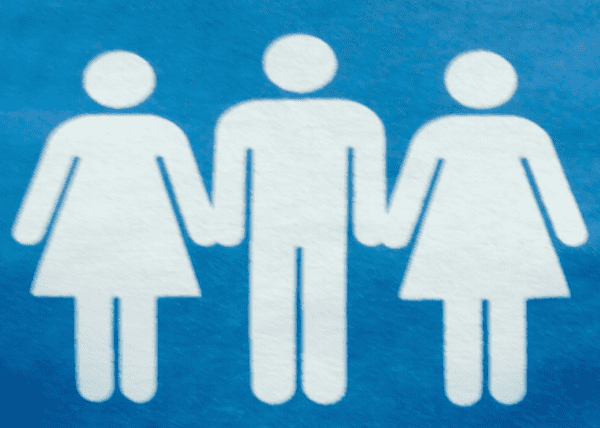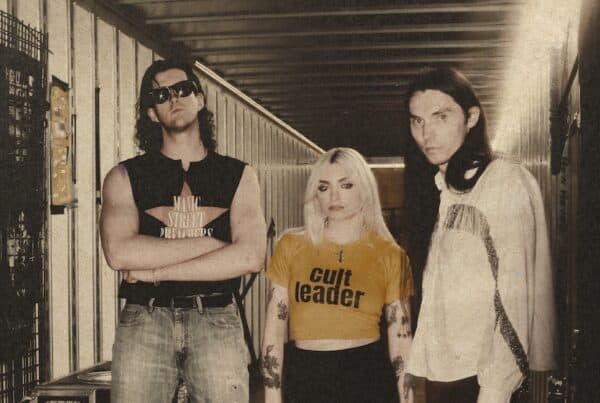For most people, Mormons are the group of people that come to mind when talking about any form of non-monogamy. That, or maybe married couples trying their hand at “swinging” in the 1960s. Both of which tend to be the butt of many jokes within popular culture. Moreover, neither of the above actually fit the dictionary definition of polyamory, “the practice of engaging in multiple sexual relationships with the consent of all the people involved.” It is a lot rarer to see real life poly people going about their daily lives with very little difference to monogamous couples (except with more timetabling and laundry).

So when did I realise I was polyamorous? I’m not sure. Maybe I never got over that thing of wanting a biscuit in each hand as a child? I know for a fact that I never truly bought into the whole “‘til death do us part” ideal of monotonous marital bliss perpetuated throughout our quaintly heteronormative society. For most of my teenage years I assumed I was completely asexual. It turns out that I was just surrounded by the wrong people. I had come to terms with the fact that I was queer by the time I came to university. It was there that I fell head over heels in love with an openly poly girl in my first term. That particular pairing didn’t work out for numerous reasons but the experience taught me that I definitely wasn’t monogamous either. There are just too many attractive people out there! As Mozart’s Don Giovanni operatically exclaims “‘I love them all! Who to one is devoted, to the rest must be faithless; mine is a heart of such infinite affection, there is not one I love not. And yet the women, dear unreas’ning creatures, my happy disposition call deceiving.’” It’s only the last sentence of that quote that I have a problem with. Ignoring the blatant misogyny, it is possible to engage in numerous sexual and romantic relationships without jealousy being too much of an issue.
[like_to_read][/like_to_read]Now let’s get one thing straight (I’m not, haha), but seriously, I do get jealous. Surprised? Some poly people don’t, admittedly (and good for them), but a surprising number do. And that’s ok! Jealousy is a natural human emotion, which, in my mind, suggests that you have personal insecurities that need to be addressed. If Othello had only had a heart to heart with Cassio, I highly doubt things would’ve ended in a bloodbath in the final act. But people spend too much time thinking focusing on jealousy and not paying enough mind to its opposite (yes, it has an opposite): compersion. I would describe compersion as a warm, fuzzy feeling of gooeyness that you feel when you see your partner being happy (romantically and sexually) with someone else. For me, polyamory is as much about the people I love loving other people too! As Linda Ronstadt once sang “It’s just that I am not in the market for a boy who wants to love only me.” And in my case, that’s not just boys!
Polyamory is of particular interest to me in terms of its role in the LGBTQ community. You don’t have to be pansexual or panromantic to be polyamorous (but it helps!). Having no gender preference is certainly a bonus for me. But what I find particularly subversive is the fact that modern society expects queer people to fit within a little box of what it deems “acceptable”. Most people are fine and dandy with cute gay couples getting married and starting a family i.e. conforming to the nuclear family stereotype complete with a dog and 2.4 kids. It can be hard sometimes to be a promiscuous queer! Tackling biphobia, for instance, is difficult when the majority of bisexuals are desperately trying to fight the stereotypes that they are promiscuous or cheaters. I remember in my first year someone asking me if I was bisexual and after a begrudging “yes”, jokingly asking me if “had a boyfriend AND a girlfriend?”, which, to their surprise, my answer was also “yes”.
Asfar as I can see there is no “one twue [sic] way” to live a poly lifestyle. There are, however, a few less ethical ways to go about having multiple relationships. You can, say, have a primary partner and many secondary ones? Or maybe a polyfidelitous ménage à trois (in which the three people involved are each others’ only partners)? A relationship anarchist does away with ranking partners altogether, viewing each individual relationship as a “living entity” without needing to form any specific hierarchy. Poly types often label ourselves “ethical sluts” after a 1997 book by Dossie Easton and Janet Hardy that many used to consider the polyamory “bible”. This is because being ethical and ensuring that all your partners and metamours (your partner’s partners) are ok with everything should be paramount. Of course, you can’t please all of the people all of the time but that is why you need to make sure that everyone is communicating and negotiating boundaries. If not, everything falls apart. In that sense, being poly is no different to being monogamous. Communication is key in any relationship regardless of how many people are involved or whether or not it is sexual. I do not consider myself in anyway to be an expert on polyamory. It’s only a lifestyle that I have been involved in for a couple of years and I’m still trying to get the hang of it. However, I can say from experience that the worst thing you can do is not communicate.
In essence, there are many things that make polyamory so appealing to me as an identity and a way of life. I like to think of myself as a person in my own right. I am nobody’s property. I have the freedom to be a lover of many things and many people without feeling guilty about it. Though, as with a lot of queer culture, there is too much focus on the sexual side of things in my opinion. As someone who is both poly and demisexual, I often find myself having warm squishy feelings for many people without ever wanting to go further. I often joke about treating my life as fanfiction in which I “ship” myself with the people in my life I care strongly about. I think that’s a good way to look at it?





